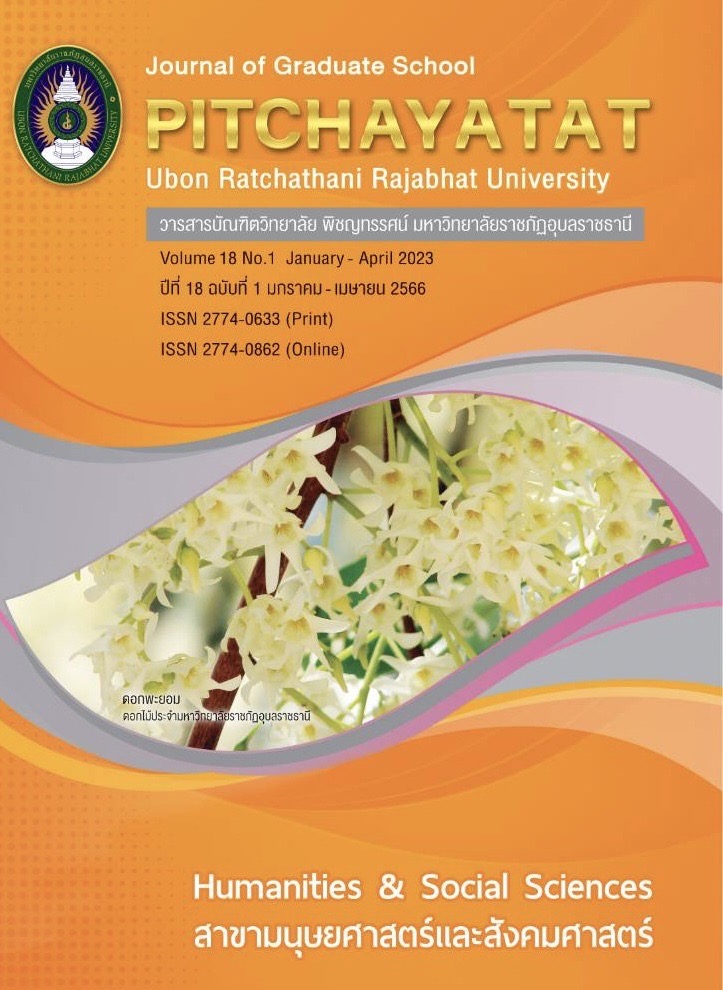การศึกษาผลสัมฤทธิ์ในการเรียนโดยการจัดการเรียนรู้เชิงรุกสำหรับเยาวชน ตำบลหัวเรือ อำเภอเมืองอุบลราชธานี จังหวัดอุบลราชธานี
คำสำคัญ:
การจัดการเรียนรู้เชิงรุก, เยาวชนตำบลหัวเรือ , ทักษะภาษาอังกฤษเพื่อการสื่อสารบทคัดย่อ
งานวิจัยนี้มีวัตถุประสงค์เพื่อ 1) เปรียบเทียบผลสัมฤทธิ์ของการเรียนรู้ก่อนและหลังการจัดการเรียนการสอนโดยใช้แผนการสอนเชิงรุกในการสอนภาษาอังกฤษเพื่อการสื่อสารให้กับเยาวชน ต.หัวเรือ อ.เมืองอุบลราชธานี จ.อุบลราชธานี และ 2) ศึกษาความพึงพอใจของเยาวชนต่อแผนการจัดการเรียนการสอนโดยใช้การสอนเชิงรุกในการสอนภาษาอังกฤษเพื่อการสื่อสารให้กับเยาวชน ต.หัวเรือ อ.เมืองอุบลราชธานี จ.อุบลราชธานี ตัวอย่างที่ใช้โดยการสุ่มตัวอย่างแบบง่ายคือ เยาวชนตำบลหัวเรือที่มีอายุระหว่าง 13-17 ปี จำนวน 54 คน เครื่องมือที่ใช้ในการวิจัย ได้แก่ แผนการจัดการเรียนรู้เชิงรุก จำนวน 5 แผน แบบทดสอบวัดผลสัมฤทธิ์ทางการเรียนก่อนและหลังเรียน แบบทดสอบระหว่างเรียนและแบบสอบถามความพึงพอใจของเยาวชนหลังเรียนภาษาอังกฤษเพื่อการสื่อสารโดยใช้แผนการเรียนรู้เชิงรุกที่พัฒนาขึ้น สถิติที่ใช้ในการวิจัย ได้แก่ ร้อยละ ค่าเฉลี่ย ส่วนเบี่ยงเบนมาตรฐาน และการทดสอบทีแบบกลุ่มสัมพันธ์
ผลการวิจัยพบว่า
- ผลการวิเคราะห์เปรียบเทียบคะแนนเฉลี่ยของผลสัมฤทธิ์ก่อนและหลังเรียนจากการจัดการเรียนรู้ตามแผนการสอนเชิงรุก พบว่า คะแนนเฉลี่ยหลังเรียน (x̅ =40.81) สูงกว่าก่อนเรียน (x̅ =23.55) อย่างมีนัยสำคัญทางสถิติที่ระดับ .05
- ผลการวิเคราะห์ความพึงพอใจของเยาวชนในการจัดการเรียนการสอนโดยใช้แผนการสอนเชิงรุกในการสอนภาษาอังกฤษเพื่อการสื่อสารให้กับเยาวชน ต.หัวเรือ อ.เมืองอุบลราชธานี จ.อุบลราชธานี พบว่า ตัวอย่างมีความพึงพอใจในภาพรวมในระดับมาก
เอกสารอ้างอิง
วิชาการ, กรม. การวิจัยเพื่อพัฒนาการเรียนรู้ตามหลักสูตรการศึกษาขั้นพื้นฐาน. กรุงเทพฯ: ม.ป.พ., 2545.
กฤษดา บุญหมื่น. ประโยชน์ของแผนการจัดการเรียนรู้. (ออนไลน์) 2555 (อ้างอิงเมื่อ 2 ตุลาคม 2563). จาก https://xn--12c2c0ada3bv5b3ao7h2d.blogspot.com/2012/07/blog-post.html
ชุมพล สุวิเชียร และคณะ. การพัฒนาชุดกิจกรรมการเรียนรู้แบบ Active Learning โดยใช้รูปแบบ SANO Model สำหรับนักเรียนชั้นมัธยมศึกษาปี ที่ 2 โรงเรียนหนองโสนพิทยาคม. กรุงเทพฯ: สำนักงานคณะกรรมการการศึกษาขั้นพื้นฐาน., 2560.
ไชยยศ เรืองสุวรรณ. Active Learning. เชียงใหม่: คณะเภสัชศาสตร์ มหาวิทยาลัยเชียงใหม่, 2553.
บุญชม ศรีสะอาด. การวิจัยเบื้องต้น. พิมพ์ครั้งที่ 7. กรุงเทพฯ: สุรีวิริยาสาสน์., 2545.
บุญเรียง ขจรศิลป์. สถิติวิจัย 1. กรุงเทพฯ: ฟิสิกส์เซ็นเตอร์การพิมพ์., 2536.
บุหงา วัฒนะ. “Active learning,” วารสารวิชาการ. 10, 9 (2546.): 30 -34.,
ประเพศ ไกรจันทร์ และธัญนันท์ ทองคำ. การสนทนาภาษาอังกฤษ. พิมพ์ครั้งที่ 3. กรุงเทพฯ: สายส่งศึกษิต, 2537.
วิชัย วงษ์ใหญ่. พัฒนาหลักสูตรและการสอน-มิติใหม่. พิมพ์ครั้งที่ 3. กรุงเทพฯ: สุรีวิริยาสาสน์., 2525.
สุมิตรา อังวัฒนกุล. วิธีสอนภาษาอังกฤษ. พิมพ์ครั้งที่ 3. กรุงเทพฯ: โรงพิมพ์จุฬาลงกรณ์มหาวิทยาลัย., 2535
Bonwell, C.C and J. A. Eison. Active Learning: Creative Excitement in the Classroom. Washington, D.C. : ASHE-ERIC Higher Education Reports, 1991.
Chickering, Arthur W. and Zelda F. Gamson. "Seven principles for good Practice,” AAHE Bulletin. 39: 3-7 March 1987): 3-7.
Silberman, M. Active Learning. Boston: Allyn & Bacon, 1996
Sutherland, T.E. and C.C. Bonwell. Using Active Learning in College Classes: A Range of Options for Faculty. San Francisco: Jossey-Bass., 1996.
ดาวน์โหลด
เผยแพร่แล้ว
รูปแบบการอ้างอิง
ฉบับ
ประเภทบทความ
สัญญาอนุญาต
ลิขสิทธิ์ (c) 2023 วารสารบัณฑิตวิทยาลัย พิชญทรรศน์ มหาวิทยาลัยราชภัฏอุบลราชธานี

อนุญาตภายใต้เงื่อนไข Creative Commons Attribution-NonCommercial-NoDerivatives 4.0 International License.
บทความทุกเรื่องได้รับการตรวจความถูกต้องทางวิชาการโดยผู้ทรงคุณวุฒิภายนอกอย่างน้อย 3 คน ความคิดเห็นในวารสารพิชญทรรศน์เป็นความคิดเห็นของผู้นิพนธ์มิใช่ความคิดเห็นของผู้จัดทำ จึงมิใช่ความรับผิดชอบของวารสารพิชญทรรศน์ และบทความในวารสารพิชญทรรศน์สงวนสิทธิ์ตามกฎหมายไทย การจะนำไปเผยแพร่ต้องได้รับอนุญาตเป็นลายลักษณ์อักษรจากกองบรรณาธิการ





